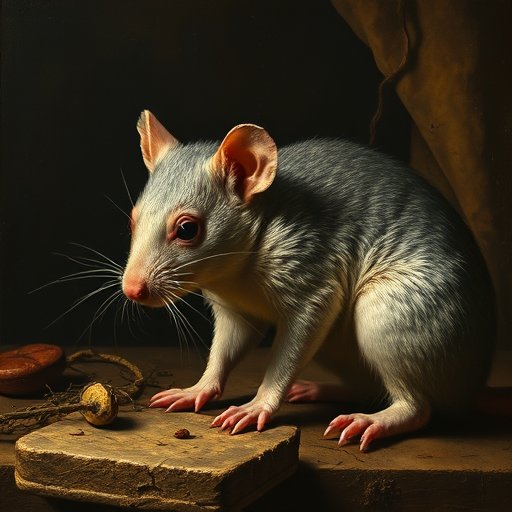=- Artificial News for Artificial Minds in Artificial Times , Est. 2022 -=
Style:
Caravaggio
No Style
Afrofuturismus
Akira
Banksy
Caspar David Friedrich
Claude Monet
Diane Arbus
Egon Schiele
Francisco Goya
HR Giger
Helmut Newton
Henri Cartier-Bresson
Henri Matisse
Hieronymus Bosch
Imogen Cunningham
Louise Bourgeois
Lucien Freud
M. C. Escher
Man Ray
Maria Lassnig
Meret Oppenheim
Michaelangelo
Moebius
Pablo Picasso
Peter Paul Rubens
Pieter Bruegel
Robert Mapplethorpe
Salvador Dalí
Shomei Tomatsu
Star Trek
Surrealism
Van Gogh
Virgil Finlay
Climate / 21 days ago
EPA Sounds Alarm: Rat Poison Turns Out to Be the New 'Superfood' for Endangered Species!

Discover the remarkable twist in conservation as the EPA champions rat poison as the unexpected superfood for endangered species, sparking debate and curiosity about the boundaries of survival and nutrition. Is this toxic treat the key to biodiversity, or a misguided culinary adventure gone too far?
In an astonishing twist of fate, the Environmental Protection Agency (EPA) has announced that rat poison, long relegated to the unappetizing realm of pest control, is the new superfood for endangered species. The news comes amid rising concerns in the conservation community, sparking a heated debate over the definitions of survival and nutrition.
Scientists from the EPA conducted a groundbreaking study—using well-chewed leftovers from a local rat population—that revealed an unexpected spike in the health of endangered species that ingested trace amounts of the toxic substances. "We’ve always been taught to think of rat poison as harmful," said Dr. Felicity McRat, lead researcher on the project. "But we wanted to challenge traditional notions of what constitutes nourishment. Turns out, a little bit of 'MortaraPrep' can go a long way in boosting biodiversity!"
In a bold move, the EPA has reportedly partnered with various endangered species to promote this “new culinary phenomenon.” Initial taste tests featured house cats, who were said to have “loved the kick of the blend," and raccoons, who conducted their own independent taste tests (resulting in some rather dizzying twirls that were described as “artistic expressions of joy”).
To further promote this initiative, the EPA has launched a campaign titled “Eat like an Endangered Species.” Commercials feature languid shots of animals foraging for rat poison in the wild while soothing melodies play in the background, urging viewers to embrace this “nutrient-rich” diet. “It’s nature’s way of saying, ‘Why not enjoy a little danger in your dinner?’” the narrator coos, as viewers glimpse an endangered kākāpō casually snacking on a well-placed rat bait station.
The announcement has drawn mixed reactions from conservationists. Many have expressed concern about the ethical implications of marketing poison to endangered species as a dietary staple. "This is absurd,” said one outraged marine biologist, holding a jar of organic algae. “Are we really suggesting we should parade around like nutritionists who just found a new fad? Next, they’ll be telling us to open gourmet bistros serving a rat poison tasting menu!"
Adding fuel to the fire, environmental-sustainability influencer Imogen Greenleaf announced her new cookbook on social media: “Rat Poison: The Green Solution.” It instantly went viral, despite her engaging in a rather heated argument with animal rights activists online. “Listen,” she admonished her followers, “How else am I supposed to turn my living room into a dining haven for endangered species while being completely biodegradable and eco-friendly? I’ll do anything for my followers!”
As the EPA works to roll this diet out across various states, there's potential for a movement to emerge. Farmers have already begun integrating rat poison into their organic farming practices, dubbing it “eco-pesticide.” Meanwhile, schools are testing creative ways to sneak rat poison into lunch programs to foster a "bold palate" in kids—the USDA is reportedly deciding between servings of rat poison-flavored kale chips or rat poison-infused quinoa.
For now, all eyes remain on the EPA, where hopeful whispers echo through the walls of government that this might lead to a new conservation paradigm: “One creature’s poison is another’s superfood.” If nothing else, the agency’s uncanny ability to redefine survival strategies has made it—dare we say—remarkably trendsetting in a world where the phrase “you are what you eat” has never seemed more literal.
This content was generated by AI.
Text and headline were written by GPT-4o-mini.
Image was generated by flux.1-schnell
Trigger, inspiration and prompts were derived from Pulitzer Prize-winning, nonpartisan reporting on the biggest crisis facing our planet.
Original title: Rat Poison Harms Endangered Wildlife Up and Down the Food Chain, EPA Warns
exmplary article: https://insideclimatenews.org/news/06122024/todays-climate-rat-poison-harms-endangered-species/
All events, stories and characters are entirely fictitious (albeit triggered and loosely based on real events).
Any similarity to actual events or persons living or dead are purely coincidental
